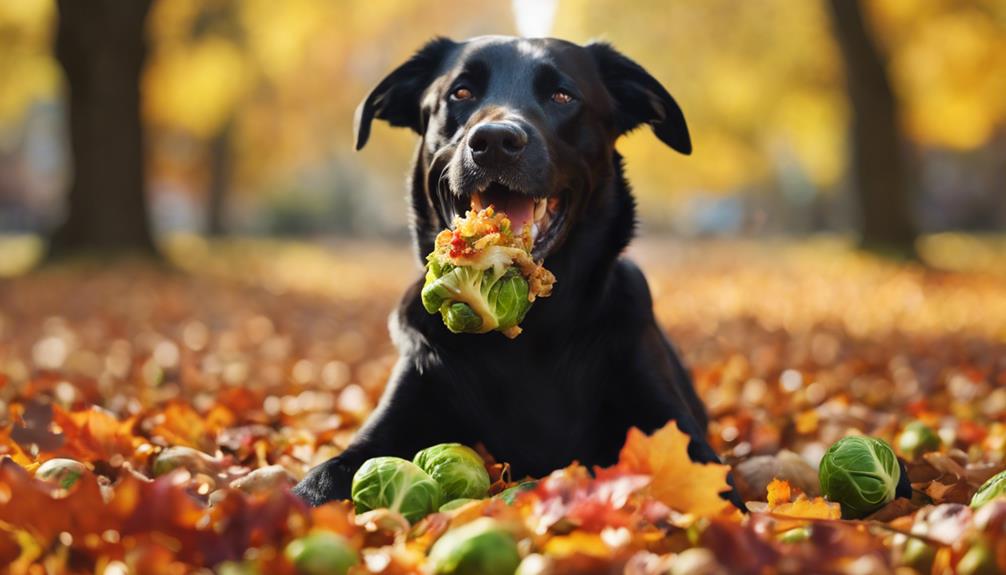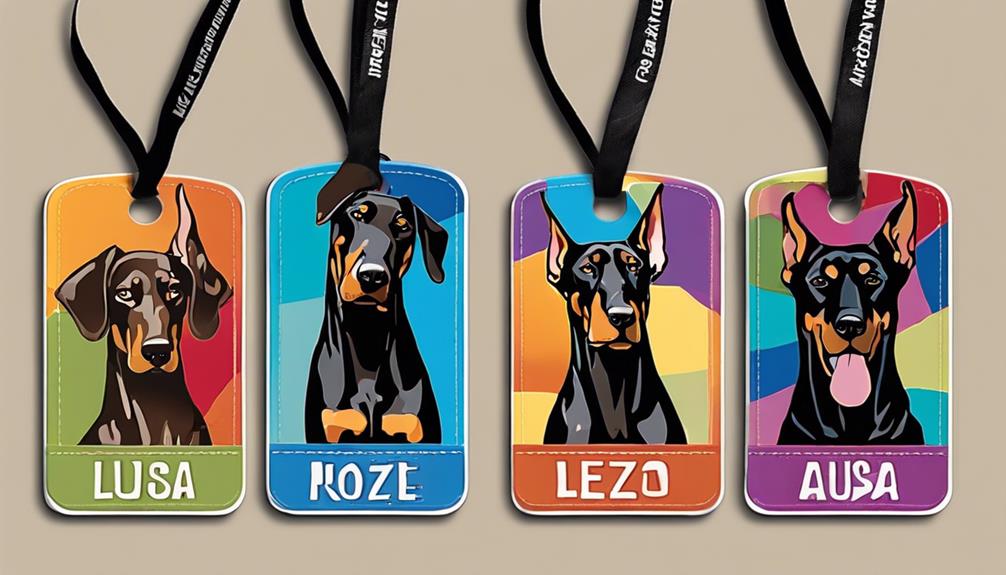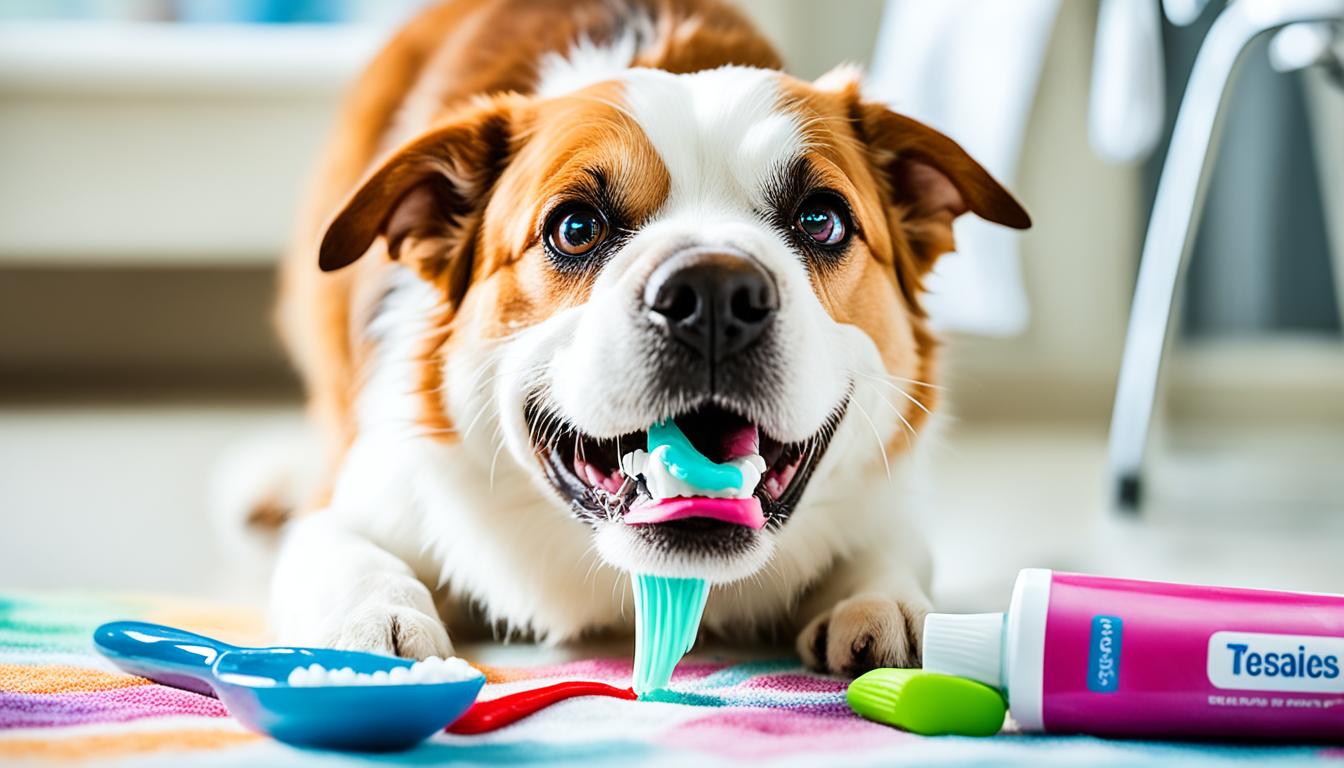Dogs can safely eat Brussels sprouts. Brussels sprouts are full of antioxidants, vitamins, and minerals. They are low in calories and high in fiber, which is good for digestion. Some risks include gas and stomach upset, so it’s best to start with small portions. Make sure to wash and cut them into small pieces before cooking for your dog. If issues persist, consult a vet. Keep an eye on your dog’s reaction and adjust as needed. A balanced diet is crucial for your dog’s health. You can also consider adding proteins and other safe veggies like carrots and green beans. Always remember, your dog’s well-being is our top priority.
Key Takeaways
- Start with small portions to gauge tolerance and prevent digestive upset.
- Monitor for signs of gas, bloating, or diarrhea after introducing Brussels sprouts.
- Consult a vet to assess dietary needs and potential allergies.
- Avoid seasonings and toxic ingredients when feeding Brussels sprouts to dogs.
- Combine Brussels sprouts with quality proteins for a balanced and nutritious diet.
Health Benefits of Brussels Sprouts for Dogs
Brussels sprouts provide dogs with a plethora of health benefits, making them a nutritious addition to their diet. These green veggies are packed with antioxidants like isothiocyanates, folate, potassium, and vitamins that can help boost your furry friend's immune system. The vitamins A, B, and C found in Brussels sprouts offer various health benefits, promoting overall well-being in dogs.
Moreover, being low in calories with only 43 calories per 100-gram serving, Brussels sprouts can be a great option for dogs looking to maintain a healthy weight. The high fiber content in these veggies also supports healthy digestion and helps stabilize blood sugar levels in our canine companions. Essential minerals like calcium, manganese, and potassium present in Brussels sprouts contribute to the overall well-being and energy of dogs. Adding Brussels sprouts to your dog's diet can be a flavorful way to enhance their health and overall condition.
Risks of Feeding Brussels Sprouts to Dogs

While Brussels sprouts offer numerous health benefits for dogs, it's important to be aware of the potential risks associated with feeding them to our furry companions. Brussels sprouts contain isothiocyanates that can lead to excessive gas in dogs, causing stomach upset and diarrhea when consumed in large quantities.
Even small portions can result in flatulence, which isn't harmful but can be uncomfortable for your pet. It's essential to monitor your dog's reaction to Brussels sprouts and adjust their intake accordingly. If symptoms like persistent gas or digestive issues arise, consulting your vet is advisable to guarantee your dog's well-being.
Although Brussels sprouts aren't toxic to dogs, moderation is key to prevent any negative effects on their digestive system. Remember to introduce new foods gradually and observe how your dog responds to them. Prioritize your furry friend's health and consult your vet if you have any concerns about feeding Brussels sprouts to your dog.
Proper Preparation of Brussels Sprouts

When preparing Brussels sprouts for dogs, it's crucial to wash them thoroughly to eliminate dirt and chemicals.
Cutting them into small, bite-sized pieces can help avoid choking hazards.
To guarantee proper digestion and nutrient absorption, consider steaming or boiling the Brussels sprouts.
Safe Cooking Methods
To guarantee high-quality nutrient retention and digestibility for our canine companions, steaming or boiling fresh and thoroughly washed Brussels sprouts are recommended cooking methods. Steaming preserves the most nutrients, making it ideal for dogs.
Boiling is another safe option, ensuring the sprouts are soft and easy to digest. If you prefer a quicker method, microwaving can also work well. Always start with fresh, green, and firm sprouts, washing them thoroughly before cooking for your dog.
Nutritional Benefits
After discussing safe cooking methods for preparing Brussels sprouts for dogs, let's now explore the nutritional benefits of these nutrient-rich vegetables.
Brussels sprouts contain:
- Antioxidants like isothiocyanates, folate, potassium, and vitamins, which help enhance your dog's immune system.
- Essential minerals such as calcium, manganese, and potassium, promoting overall health in your furry friend.
- High levels of fiber, aiding in healthy digestion and stabilizing blood sugar levels in dogs.
These benefits make Brussels sprouts a great addition to your dog's diet. They're rich in vitamins, low in calories, and beneficial for your dog's well-being. Incorporating these nutrient-packed vegetables can contribute to your dog's overall health and well-being.
Serving Size Tips
For optimal preparation of Brussels sprouts for your dog, consider starting with small portions, typically 1/2 to 1 sprout, depending on your dog's size. Brussels sprouts are rich in nutrients and can be beneficial when included in your dog's diet in moderation. When feeding your dog Brussels sprouts, it is crucial to wash and prepare them by removing most of the stem and chopping them into bite-sized pieces. Steaming, boiling, or microwaving the Brussels sprouts can help retain nutrients and aid in digestion. Remember to avoid serving raw Brussels sprouts to dogs, as they can be hard to digest and may pose a choking hazard. Keep it simple by skipping herbs, spices, butter, oil, salt, or bacon when preparing Brussels sprouts for your furry friend.
| Preparation Tips for Brussels Sprouts |
|---|
| Wash and chop into bite-sized pieces |
| Steam, boil, or microwave for digestion |
| Avoid serving raw Brussels sprouts |
| Skip adding herbs, spices, or salt |
Serving Size Guidelines for Dogs
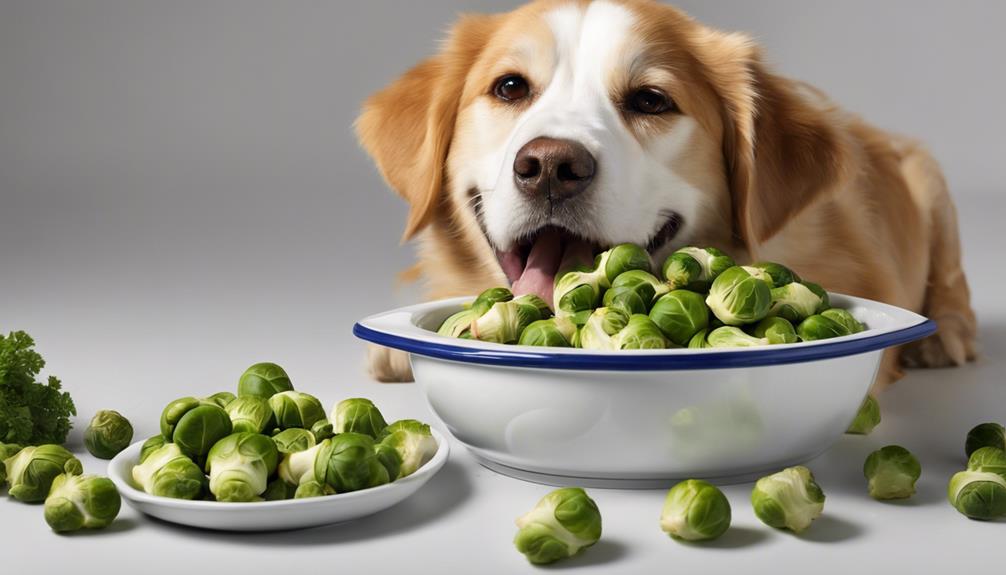
When determining serving sizes for dogs, consider their size and dietary needs to guarantee balanced nutrition. It's crucial to make sure that your furry friend receives the correct amount of food to stay healthy and happy.
Here are some guidelines to help you with serving sizes for dogs:
- For smaller dogs, start with half to one Brussels sprout per serving.
- Larger dogs can have up to three Brussels sprouts per serving.
- Moderation is key to prevent dietary imbalances.
Nutrient Balance in Dog Diets
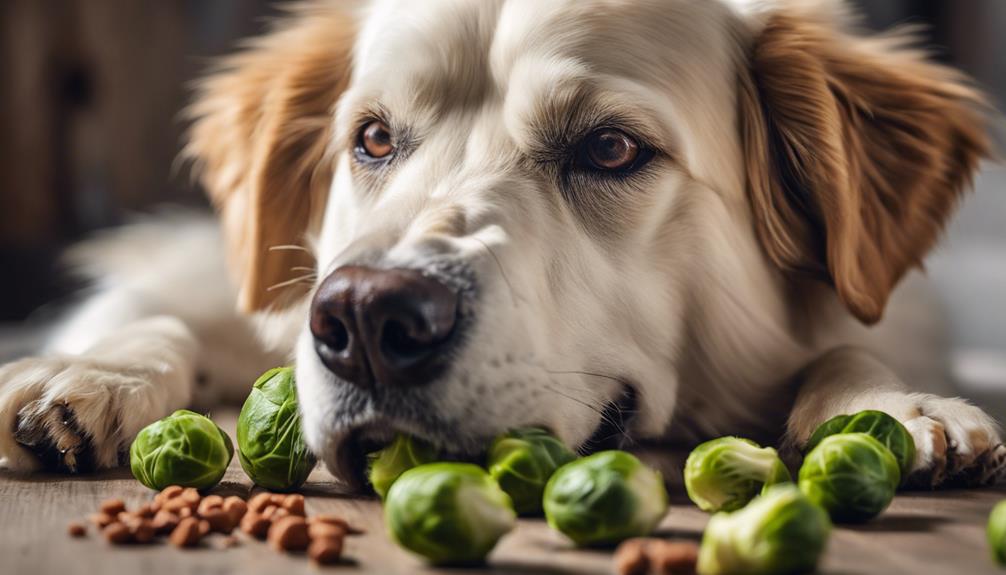
To guarantee good health and well-being for dogs, maintaining a proper balance of nutrients in their diets is essential. Dogs require a mix of proteins, fats, carbohydrates, vitamins, and minerals to thrive. Proteins are important for muscle development, repair, and growth in dogs.
Fats play a key role in skin health, coat shine, and cognitive function. Carbohydrates provide the energy needed for daily activities and support digestion and nutrient absorption. Ensuring that your dog's diet includes these essential nutrients in the right proportions is fundamental for their overall health.
When planning your dog's meals, consider incorporating a variety of high-quality ingredients to achieve a well-rounded diet that meets their nutritional needs. By focusing on nutrient balance, you can help support your dog's energy levels, immune function, and overall well-being.
Consultation With a Vet Before Feeding

Before introducing Brussels sprouts to your furry friend, it's important to consult with a vet. Your vet can assess any potential dietary issues or allergies your dog may have.
Monitoring your dog's reaction and starting with small portions, based on their size, are key steps in ensuring their well-being.
Vet Approval Essential
Consulting with a veterinarian is crucial before incorporating Brussels sprouts into your dog's diet to ensure their well-being. When seeking vet approval, consider the following:
- Assessment of Individual Health Needs: Vets can evaluate your dog's specific health requirements and advise on whether Brussels sprouts are suitable.
- Monitoring Digestive Issues: Vets can help identify any digestive problems your dog may experience after consuming Brussels sprouts, ensuring their digestive health isn't compromised.
- Guidance on Portion Control: Vets can recommend appropriate portion sizes of Brussels sprouts for your dog, preventing overconsumption and potential digestive discomfort.
Health Considerations Paramount
When exploring the addition of Brussels sprouts to our dog's diet, it's vital to prioritize health considerations by seeking guidance from a veterinarian. Consulting a vet before feeding Brussels sprouts to your dog is important for ensuring their well-being.
Vets can offer advice on portion sizes, frequency of feeding, and how to monitor any adverse reactions. It's imperative to verify that Brussels sprouts are safe and suitable for your dog's specific dietary needs. By involving a vet, you can tailor the approach to include Brussels sprouts based on your dog's individual health requirements.
This professional guidance can help mitigate potential risks associated with introducing Brussels sprouts into your dog's diet, promoting their overall health and wellness.
Monitor Dogs Reaction
We suggest closely monitoring your dog's reaction after introducing Brussels sprouts into their diet and seeking guidance from a veterinarian. When incorporating new food into your dog's diet, it's essential to pay attention to any changes in their gastrointestinal tract.
To guarantee your furry friend's well-being, follow these tips:
- Observe for signs of digestive upset such as gas, bloating, or diarrhea.
- Start with small portions of Brussels sprouts to gauge your dog's tolerance.
- Keep an eye out for any allergic reactions or gastrointestinal issues.
Considerations for Digestive Health

Considering digestive health when feeding your dog Brussels sprouts is essential to prevent potential gastrointestinal issues.
While dogs can eat Brussels sprouts, it's important to be mindful of their digestive systems. These veggies contain isothiocyanates that can cause excessive gas in dogs.
Moderate amounts of Brussels sprouts can actually aid in digestion, but too much can lead to stomach upset and diarrhea. Even small portions may result in flatulence, which is generally harmless but can be uncomfortable for your furry friend.
If you notice any signs of digestive issues like gas, bloating, or diarrhea after your dog consumes Brussels sprouts, it's best to consult with a vet.
To prevent problems, start with small servings of Brussels sprouts and carefully monitor your dog's reaction. Only increase the quantity if their digestive health remains stable.
Avoiding Seasonings in Brussels Sprouts
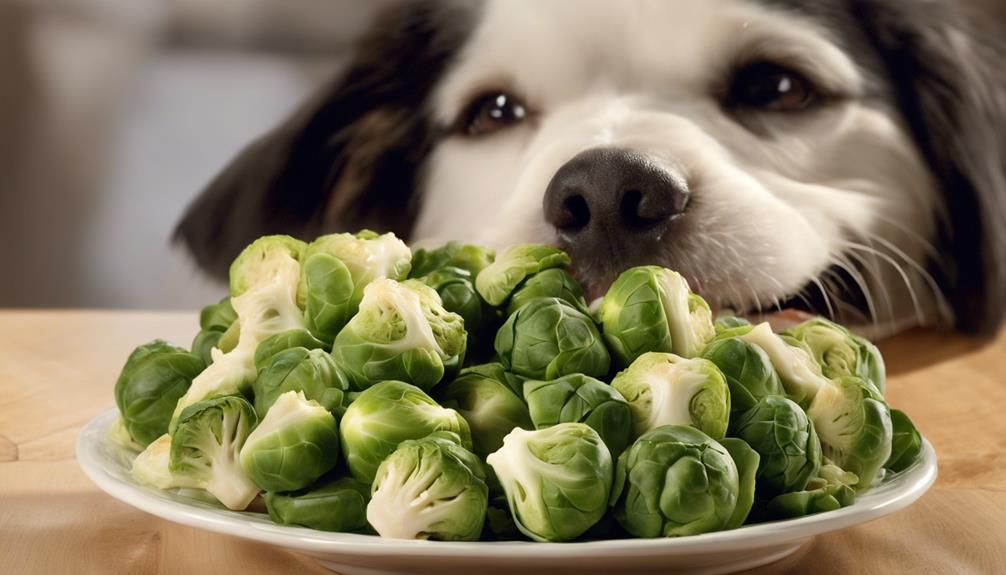
To guarantee the safety of your dog, always feed plain Brussels sprouts without any added seasonings. When preparing Brussels sprouts for your canine companion, it's vital to avoid including harmful seasonings that could potentially lead to toxicity or digestive issues. Here are some essential points to keep in mind:
- Opt for Plain Brussels Sprouts: Choose fresh Brussels sprouts and make sure they're plain without any additional seasonings like garlic, onions, salt, or spices.
- Avoid Toxic Ingredients: Steer clear of ingredients that are known to be toxic to dogs when incorporating Brussels sprouts into their diet.
- Prioritize Safety: Seasonings can cause adverse reactions in dogs, making it important to feed them plain Brussels sprouts to safeguard their well-being.
Incorporating Proteins With Brussels Sprouts
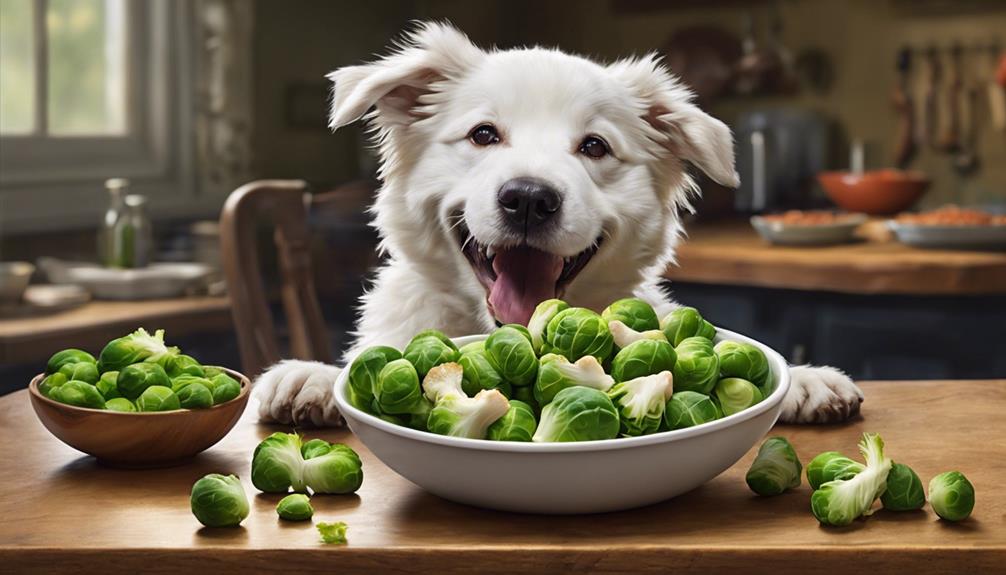
Combining quality proteins like chicken, turkey, beef, or fish with Brussels sprouts guarantees a balanced diet rich in essential nutrients for dogs. When you mix these proteins with Brussels sprouts, you provide your furry friend with a variety of amino acids important for muscle growth, repair, immune function, hormone production, and enzyme activity. This combination makes sure that your dog gets all the necessary nutrients to thrive.
Check out the table below to see how proteins can complement the nutrients found in Brussels sprouts:
| Proteins | Benefits |
|---|---|
| Chicken | High in lean protein |
| Turkey | Rich in essential vitamins and minerals |
| Beef | Provides iron for energy production |
| Fish | Omega-3 fatty acids for a healthy coat |
Other Safe Veggies for Dogs to Eat
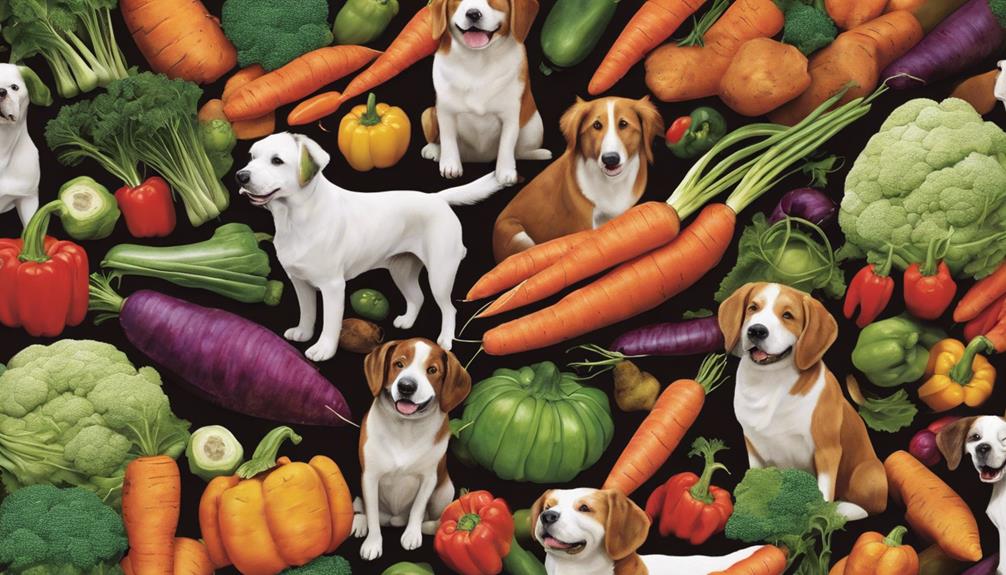
We suggest incorporating a variety of safe vegetables in your dog's diet to make certain they receive a range of nutrients and flavors. When it comes to other safe veggies for dogs to eat, there are several options to contemplate:
- Carrots: Dogs can munch on raw or cooked carrots as a healthy snack. Carrots are low in calories and high in fiber and vitamins, making them a great addition to your pup's diet.
- Sweet Potatoes: Rich in antioxidants, vitamins, and fiber, sweet potatoes are a nutritious choice for dogs. They can be given cooked and mashed or even sliced and baked as tasty treats.
- Green Beans: Whether fresh, frozen, or canned (without added salt), green beans are a safe vegetable for dogs. They provide a crunchy texture and are packed with vitamins and minerals beneficial for your furry friend.
Including these veggies alongside Brussels sprouts can offer a diverse array of nutrients and flavors, keeping your dog's diet interesting and nutritious.
Frequently Asked Questions
Why Can't Dogs Eat Brussel Sprouts?
Dogs should avoid Brussels sprouts due to potential digestion issues like blockages, smelly farts, diarrhea, and tummy aches. Raw sprouts are tough and pose choking hazards, so moderation is key.
A balanced diet with proteins and healthy fats is vital for dogs' health. Consult a vet before introducing new foods to prevent nutrient deficiencies.
Prioritize your dog's well-being by making informed dietary choices.
How Much Brussel Sprouts Can I Give My Dog?
When it comes to feeding your dog Brussels sprouts, it's important to start small. Begin with 1/2 to 1 sprout, adjusting based on your dog's size. Keep an eye out for any digestive issues as you gradually introduce this veggie.
Larger dogs can have up to three sprouts per serving. Remember, moderation is key to prevent tummy troubles. If in doubt, consult your vet for personalized advice.
Can Dogs Have Brussels Sprouts Raw or Cooked?
Dogs can have Brussels sprouts, but it's safer for them to eat cooked rather than raw. Raw Brussels sprouts can be tough on their digestion and pose a choking hazard. Cooking Brussels sprouts makes them easier for dogs to digest and improves their taste.
Steaming is better than boiling to retain more nutrients. Avoid feeding raw Brussels sprouts to prevent digestive issues and make sure to cook them before offering them to your furry friend.
Are Brussel Sprouts Good for Dogs With Liver Disease?
Brussels sprouts are excellent for dogs with liver disease. They provide antioxidants that reduce inflammation and protect liver cells. The high fiber aids digestion and gut health, important for liver issues.
Essential vitamins like K support blood clotting and liver function. These nutrients boost the immune system, helping fight infections. When prepared well and given in moderation, Brussels sprouts offer essential nutrients and antioxidants, promoting liver function.
Are Certain Foods Safe for Dogs to Eat?
Yes, dogs can eat tostadas safely. However, it is important to ensure that the tostadas are plain, without any spicy toppings or excessive salt. Dogs can also enjoy toppings like plain chicken or cheese in moderation. Always consult with your veterinarian before introducing new foods to your dog’s diet.
Conclusion
So, while dogs can safely eat brussel sprouts, it's important to remember that moderation is key. As with any new food, introduce it slowly and watch for any potential digestive issues.
And remember, just because your furry friend can enjoy this veggie doesn't mean they should become a full-time vegetarian. Balance is key, so keep their diet varied and nutritious.
Who knew that these tiny cabbages could be a tasty treat for our canine companions?
